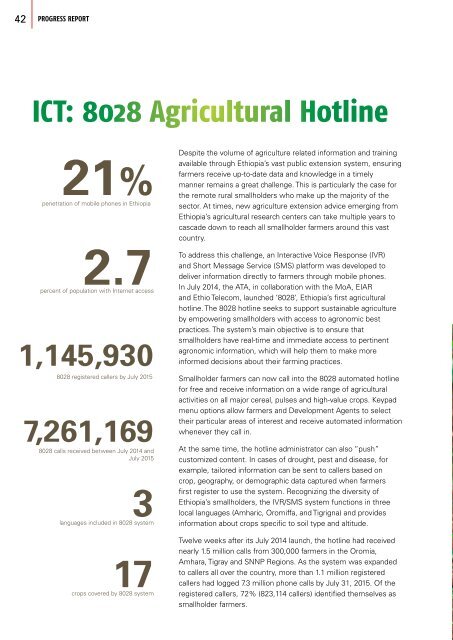PROGRESS REPORT
1LLMfQ4
1LLMfQ4
You also want an ePaper? Increase the reach of your titles
YUMPU automatically turns print PDFs into web optimized ePapers that Google loves.
42 <strong>PROGRESS</strong> <strong>REPORT</strong> PROGRAM LEVEL <strong>PROGRESS</strong> <strong>REPORT</strong> 43<br />
ICT: 8028 Agricultural Hotline<br />
21%<br />
penetration of mobile phones in Ethiopia<br />
2.7<br />
percent of population with Internet access<br />
1,145,930<br />
Despite the volume of agriculture related information and training<br />
available through Ethiopia’s vast public extension system, ensuring<br />
farmers receive up-to-date data and knowledge in a timely<br />
manner remains a great challenge. This is particularly the case for<br />
the remote rural smallholders who make up the majority of the<br />
sector. At times, new agriculture extension advice emerging from<br />
Ethiopia’s agricultural research centers can take multiple years to<br />
cascade down to reach all smallholder farmers around this vast<br />
country.<br />
To address this challenge, an Interactive Voice Response (IVR)<br />
and Short Message Service (SMS) platform was developed to<br />
deliver information directly to farmers through mobile phones.<br />
In July 2014, the ATA, in collaboration with the MoA, EIAR<br />
and Ethio Telecom, launched ‘8028’, Ethiopia’s first agricultural<br />
hotline. The 8028 hotline seeks to support sustainable agriculture<br />
by empowering smallholders with access to agronomic best<br />
practices. The system’s main objective is to ensure that<br />
smallholders have real-time and immediate access to pertinent<br />
agronomic information, which will help them to make more<br />
informed decisions about their farming practices.<br />
Registered<br />
Callers<br />
Total Calls<br />
Amhara 267,808 2,199,835<br />
Oromia 295,417 2,398,936<br />
SNNP 96,849 633,039<br />
Tigray 30,879 253,735<br />
Other Regions 288,370 1,592,913<br />
Unspecified 166,607 182,711<br />
Total 1,145,930 7,261,169<br />
Functionally, tailored information has initially been<br />
made available on the cultivation of Ethiopia’s<br />
dominant crops, including the major cereals (tef,<br />
wheat, barley and maize), pulses and oilseeds<br />
(sesame and chickpea), horticulture crops<br />
(tomato, green pepper, onion and cabbage) as<br />
well as coffee and cotton. Over 100,000 SMS<br />
messages have also been sent out informing<br />
smallholders on the use of improved seeds and<br />
farming techniques to increase their yields. An<br />
additional 400,000 SMS messages have been<br />
disseminated to farmers to alert them to the<br />
prevalence of wheat rust and maize necrosis<br />
disease, and to provide advice on how to protect<br />
their crops.<br />
As part of ongoing enhancements, the IVR/<br />
SMS system has been generating a number<br />
of reports, analyses, and dashboards enabling<br />
system administrators to maximize the operation<br />
and impact of the system based on information<br />
collected from registered callers. Additional<br />
content is being developed during 2015 for the<br />
next phase of the project.<br />
In addition, partnerships are being established<br />
with other government and donor funded<br />
initiatives to leverage the 8028 system to<br />
disseminate information relative to these other<br />
engagements. An interactive helpdesk that will<br />
enable smallholders to submit specific questions<br />
to agronomic experts, and a grassroots M&E<br />
tool that will facilitate data collection at the most<br />
granular levels, will also be included as additional<br />
features.<br />
8028 registered callers by July 2015<br />
7,261,169<br />
8028 calls received between July 2014 and<br />
July 2015<br />
3<br />
languages included in 8028 system<br />
17<br />
crops covered by 8028 system<br />
Smallholder farmers can now call into the 8028 automated hotline<br />
for free and receive information on a wide range of agricultural<br />
activities on all major cereal, pulses and high-value crops. Keypad<br />
menu options allow farmers and Development Agents to select<br />
their particular areas of interest and receive automated information<br />
whenever they call in.<br />
At the same time, the hotline administrator can also “push”<br />
customized content. In cases of drought, pest and disease, for<br />
example, tailored information can be sent to callers based on<br />
crop, geography, or demographic data captured when farmers<br />
first register to use the system. Recognizing the diversity of<br />
Ethiopia’s smallholders, the IVR/SMS system functions in three<br />
local languages (Amharic, Oromiffa, and Tigrigna) and provides<br />
information about crops specific to soil type and altitude.<br />
Twelve weeks after its July 2014 launch, the hotline had received<br />
nearly 1.5 million calls from 300,000 farmers in the Oromia,<br />
Amhara, Tigray and SNNP Regions. As the system was expanded<br />
to callers all over the country, more than 1.1 million registered<br />
callers had logged 7.3 million phone calls by July 31, 2015. Of the<br />
registered callers, 72% (823,114 callers) identified themselves as<br />
smallholder farmers.


